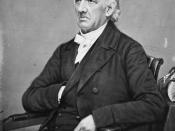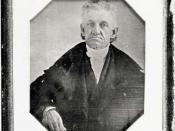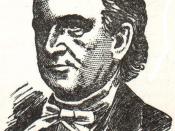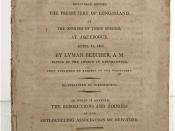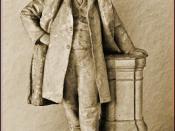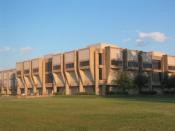Lyman Beecher among other things was concerned with eradicating the American problems of the breaking of the Sabbath, profane language, and drinking. Beecher stressed the will of humanity to turn away from sin. He argued that disestablishment would undermine the authority of moral elites such as himself. Men of talent and virtue would be driven from positions of leadership. Similarly, he insisted that disestablishment would lead to chaos in political and religious life that would lead to dangerous divisions of society based on jealousy, greed, and ambition. Beecher fought energetically to maintain unity, and religious denominational harmony, because this, he believed, was necessary to preserve society. "Sin is black, grace abounds, the will is free."-Lyman BeecherBeecher became a part of the New School of Presbyterianism, where he preached his message of resisting sin. In 1813, Beecher founded the Connecticut Society for the Reform of Morals. The group initiated a movement to wipe out the problems the Beecher felt was wrong with American society.
Beecher in 1826 was chosen to head the new Hanover Street Church in Boston, which was started to combat the growth of Unitarianism. In 1832, Beecher seized the opportunity to bring religion to the American West by becoming president of the Lane Theological Seminary in Cincinnati, Ohio, as well as pastor of the city's Second Presbyterian Church.
By preaching his message of purity and unity, a more hopeful message, twice on Sunday and at meetings during the week, he drew a large following. Six sermons in which he preached against intemperance in 1825 found wide circulation when published; they were even translated into several languages. At the Hanover Street Church in Boston, Beecher met with so much success that he was compared to Jonathan Edwards, leader of the Great Awakening in New England in the 1700s.
Beecher's term at the Lane Theological Seminary came at a time when a number of burning issues, particularly slavery, threatened to divide the Presbyterian Church, the state of Ohio, and the nation. In 1834, students at the school debated the slavery issue and many of them chose to adopt the cause of abolitionism. Beecher opposed their position and refused to offer classes to African-Americans. This event sparked a growing national discussion of abolition that contributed to the beginning of the Civil War. Beecher was also notorious for his anti-Catholicism beliefs. His sermon on this subject at Boston in 1834 was followed shortly by the burning of the Catholic Ursuline sister's convent there.
Beecher worked effortlessly tried to bring his religious views to the west. It was his main goal, and he went so far as to write a book titled "A Plea for the West." His views on unity and harmony, within politics and religion, were another seemingly fanatical dream, that people could be united by religion. This was a feat that was much too large for this one man to try to accomplish, and was simply an idea at the time which was unachievable.
Beecher saw religious difference not simply as something to be either embraced or resisted, but rather as something to be guided and cultivated. And regardless of his success in this venture, Beecher certainly helped to set the terms of debate over the meaning of religious difference, and perhaps cultural difference more generally, in the early part of the nineteenth century. This debate would remain vital throughout the nineteenth century and indeed, though greatly changed, it remains vital to us today. Beecher discovered how voluntary groups could powerfully work toward healing social ills, an idea well before its time.
In conclusion Lyman Beecher was a man who brought tried to bring peace into a nation full of turbulence, and preach a message of tolerance, that is still of prominence in today's society.
Works CitedBackes, Matthew W. "Lyman Beecher and the Problem of Religious Pluralism in the Early American Republic." The American Religious Experience. 4 Nov. 2008 .
"Lyman Beecher: Revivalist who moved with the times." Christian History. 8 Aug. 2008. Christianity Today International. 4 Nov. 2008 .
"Lyman Beecher." American History. 2008. ABC-CLIO. 4 Nov. 2008 .
"Lyman Beecher." An American Family: The Beecher Tradition. Newman Library Digital Collections. 4 Nov. 2008 .
"Lyman Beecher." NNDB: Tracking the Entire World. 2008. Soylent Communications. 4 Nov. 2008 .
Portrait of Lyman Beecher. 1850. Harriet Beecher Stowe Center, Hartford, CT.
